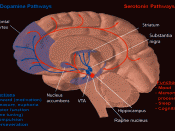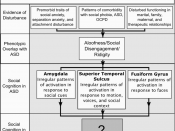Deriving from theory, experiments and applied Health Psychology, this report will present definitions of the different types of eating disorders i.e. anorexia nervosa and bulimia. It will provide etiology of the different types of eating disorders according to the different psychology school of thoughts; briefly it will present the causes according to psychoanalytic, cognitive, learning school of thought and will analyze the possibility of genetic influences and whether some of these disorders could be innate. However, more attention will be given to the effects of social cultural influences on maladaptive eating habits.
Eating Disorder (ED) Defined
Experts generally agree that a person with "behavioral problems associated with an excessive preoccupation with weight and shape, and consequent difficulties with the control of eating and weight" is considered to be suffering from an ED (Mayer, 2005). Despite the fact that anorexia nervosa (AN) and bulimia nervosa (BN) are commonly identified as THE eating disorders, there are other types of disorders known as Eating Disorders not Otherwise Specified (EDNOS); they are usually not as serious as AN and BN but are surely of the same kind.
The most common primary symptoms of eating disorders include depression, anxiety, obsessionality and social withdrawal (Hermen and Polivy, 2005). Specifically, AN is associated with chronic dieting and BN with binge eating and forced puking. It is important to note that these symptoms have to be chronic in nature and not the transient and occasional bouts of abnormal or restrictive eating behaviors.
Causes of ED
Causes of eating disorders are subject to much variations and debate. They range from genetic predisposition which suggest hereditary factors to psychoanalytical which blames early childhood experiences and subconscious conflicts. The cognitive school, among other factors, attributes ED to "obsessive thoughts, inaccurate judgments and rigid thinking patterns" (Hermen and Polivy,



Nicely done
Nice paper. I love the works cited, it seems so many people on here often leave them off. Thanks.
2 out of 2 people found this comment useful.